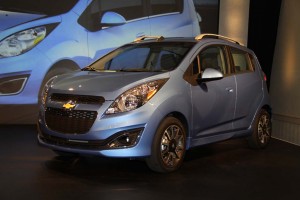
Owners like the benefits of a battery-car like the Chevrolet Spark EV - but potential buyers have plenty of concerns.
There are plenty of potential buyers who are drawn to the fuel savings and the general environmental benefits of battery cars, but a new study warns that unless prices come down those vehicles will remain “a very small part” of the overall U.S. market.
That’s no surprise to industry planners and engineers who have made cost one of their primary targets for next-generation battery cars. But they caution that significant breakthroughs aren’t likely to come quickly.
“The bottom line is that the price has to come down, which requires a technological quantum leap,” said Neal Oddes, senior director of environmentally friendly practices at J.D. Power and Associates. The infrastructure for electric vehicles – especially the availability of quick chargers – also has to improve, he stressed, and “Until those two concerns are addressed, EV sales will remain flat.”
All told, combined sales of conventional hybrids, plug-in hybrid-electric vehicles (PHEVs), and battery-electric vehicles, or BEVs, are barely 3% of the overall U.S. market, demand rising only modestly over the past year despite a flood of new models and the tailwind of near-record fuel prices.
According to Power’s 2012 Electric Vehicle Ownership Experience Study, current battery-car owners most often point to environmental benefits as the top factor in choosing a vehicle like the Nissan Leaf or Chevrolet Volt, 44% point5ing to reduced emissions.
Among those considering an EV, however, 45% say the most important factor would be lowering fuel costs. Existing battery-car owners note that while their electric bills have increased an average $18 a month they have reduced gasoline bills an average $147 a month.
The problem, notes Oddes, is that there is a “disconnect” between the potential savings and the actual purchase premium, which can add thousands to the price tag of a battery-based vehicle when compared to a similar, but conventionally powered automobile. On a BEV, the typical increase is around $10,000, while it jumps to $16,000 on a plug-in, Power estimated.
“The payback period is longer than most consumers keep their vehicle,” the analyst stressed, noting that for a pure electric, Power estimates the so-called payback period is around 6.5 years for a $10,000 price premium. On an PHEV, meanwhile, payback jumps to as much as 11 years.
The cost of ownership can jump significantly once an EV owner opts for a special 240-volt home charger – though that does provide several advantages. According to the study, 31% of owners have subscribed to time-of-day rate plans that allow them to charge during off-peak hours at a significantly reduced rate. The higher-power charging systems also substantially reduce the time a vehicle needs to be connected.
The new Chevrolet Spark EV, for example, can recharge on 240-volts in about four hours. Plugging into a standard 120-volt outlet, the maker warns, would require nearly a full day to recharge.
A major portion of EV owners say they recharge at home, meanwhile, though the growing number of charging stations clearly is a factor in enhancing the appeal of the technology, according to the study. Almost half of EV owners now charge away from home though there is still some confusion about where charging stations are located.
A preliminary study by start-up battery maker Coda found a sizable number of owners charging away from home, some reducing their electric bills by as much as 90% in the process.
Driving range is another issue of serious concern among potential EV buyers. But reality suggests that, in most cases, even today’s limited range can more than suffice, the study finding EV owners commute an average 34 miles a day. That’s about the battery range of the plug-in Chevy Volt and less than half the range of the Nissan Leaf.
“There still is anxiety among consumers about the cost and lifespan of EV batteries, the infrastructure needed to charge EVs and the vehicle’s driving range,” said Oddes. “Automakers need to continue to address these issues and educate consumers about the benefits of EV technologies in order to gain momentum in the marketplace.”
Significantly, the study found that once motorists switch to EVs they’re generally pleased with their vehicles – and are likely to become more loyal to the manufacturer.
How soon manufacturers will address the issues of concern remains to be seen, but while battery costs are expected to drop substantially, that won’t happen quickly, according to General Motors’ technology director Jon Lauckner. He cautioned that from the current price of around $500 to $700 a kilowatt-hour, costs likely won’t slip below $200 until around decade’s end, at the earliest. On a vehicle like the Chevy Spark EV with 20 kWh of batteries, the difference will eventually be substantial.
